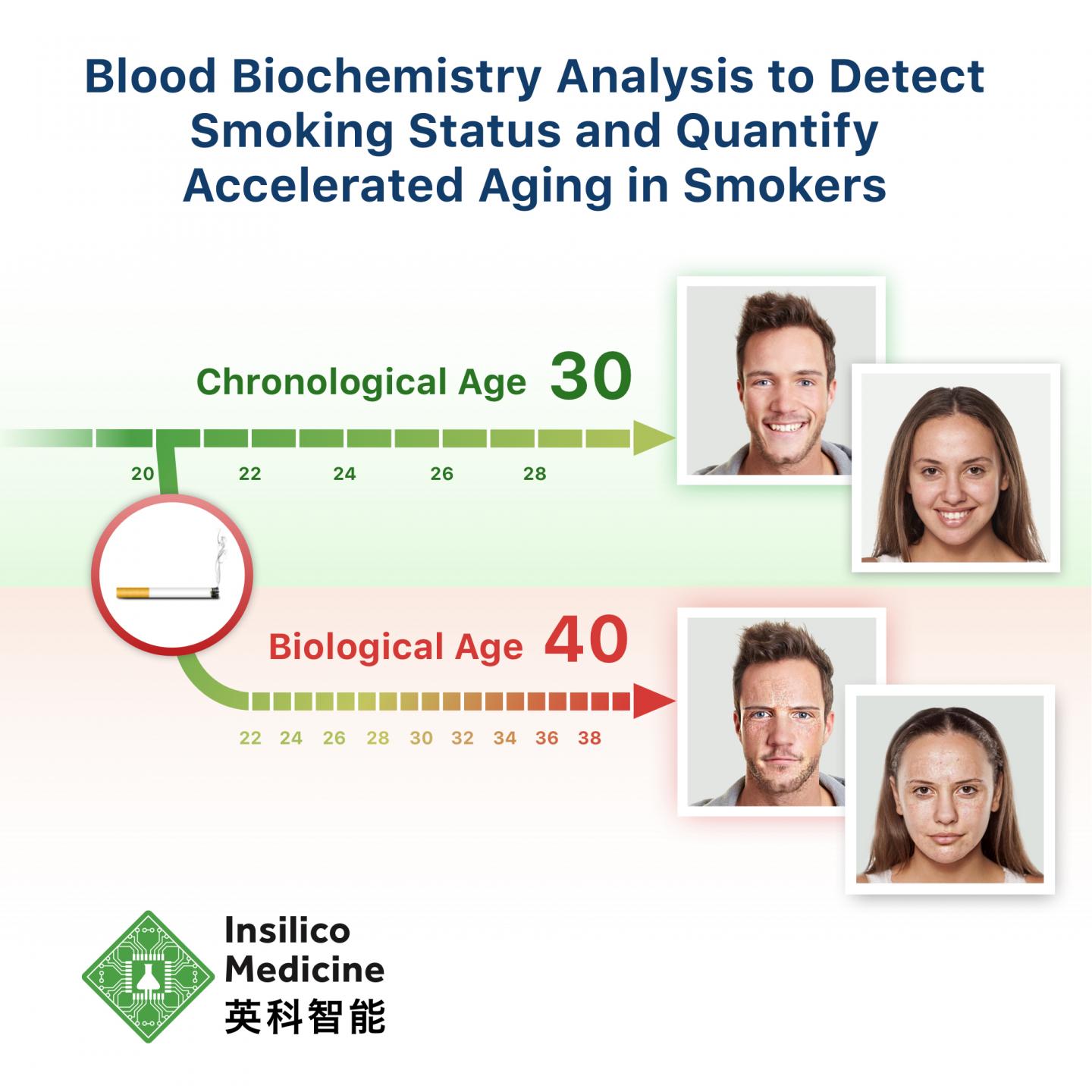Artificial intelligence provides insights into how deep-learned biochemistry clocks effectively determine biological age of smokers and predict smoking status

Credit: Insilico Medicine
Jan 16, 2019, Rockville, MD – Insilico Medicine, one of the leaders in artificial intelligence for drug discovery, biomarker development, digital medicine, and aging research, announced the publication of a new collaborative research paper titled “Blood Biochemistry Analysis to Detect Smoking Status and Quantify Accelerated Aging in Smokers” in Scientific Reports.
Smoking has long been proven to negatively affect people’s overall health in multiple ways. The study by Insilico scientists set out to determine biological age differences between smokers and non-smokers, and to evaluate the impact of smoking using blood biochemistry and recent advances in artificial intelligence. By employing age-prediction models developed by supervised deep learning techniques, the study analyzed a number of biochemical markers, including measures based on glycated hemoglobin, urea, fasting glucose and ferritin.
According to study’s results, smokers demonstrated a higher aging ratio, and both male and female smokers were predicted to be twice as old as their chronological age as compared to nonsmokers. The results were carried out based on the blood profiles of 149,000 adults.
Other findings suggested that deep learning analysis of routine blood tests could replace the current unreliable method of self-reporting of smoking status and evaluate the influence that other lifestyle and environmental factors have on aging.
“I am pleased to be part of the research study, which provides fascinating scientific evidence that smoking is likely to accelerate aging. Smoking is a real problem that destroys people’s health, causes premature deaths, and is often the cause of many serious diseases. We applied artificial intelligence to prove that smoking significantly increases your biological age,” said Polina Mamoshina, a senior research scientist at Insilico Medicine.
###
Insilico Medicine is regularly publishing research papers in peer-reviewed journals. The company was first to apply the generative adversarial networks (GANs) to the generation of the new molecular structures with the specified parameters and published a seminal peer-reviewed paper submitted in June 2016. The concept was further extended and augmented with advanced memory and reinforcement learning. One of the latest papers published in the Journals of Gerontology demonstrated the application of the deep neural networks to assessing the biological age of the patients. The latest special issue in Molecular Pharmaceutics featured several research papers by Insilico Medicine. Recently the company published an overview of its work in artificial intelligence for aging and longevity research in Aging Research Reviews.
For further information, images or interviews, please contact:
Contact: Polina Firsanova
[email protected]
Website: http://insilico.
Please follow the link below to read the article:
About Insilico Medicine, Inc
Insilico Medicine is an artificial intelligence company headquartered in Rockville, with R&D and management resources in Belgium, Russia, UK, Taiwan, and Korea sourced through hackathons and competitions. The company and its scientists are dedicated to extending human productive longevity and transforming every step of the drug discovery and drug development process through excellence in biomarker discovery, drug development, digital medicine, and aging research.
Insilico pioneered the applications of the generative adversarial networks (GANs) and reinforcement learning for generation of novel molecular structures for the diseases with a known target and with no known targets. In addition to working collaborations with the large pharmaceutical companies, the company is pursuing internal drug discovery programs in cancer, dermatological diseases, fibrosis, Parkinson’s Disease, Alzheimer’s Disease, ALS, diabetes, sarcopenia, and aging. Through a partnership with LifeExtension.com, the company launched a range of nutraceutical products compounded using the advanced bioinformatics techniques and deep learning approaches. It also provides a range of consumer-facing applications including Young.AI.
In 2017, NVIDIA selected Insilico Medicine as one of the Top 5 AI companies in its potential for social impact. In 2018, the company was named one of the global top 100 AI companies by CB Insights. In 2018 it received the Frost & Sullivan 2018 North American Artificial Intelligence for Aging Research and Drug Development Award accompanied with the industry brief. Brief company video: https:/
Media Contact
Qingsong Zhu
[email protected]
240-641-6266
Related Journal Article
http://dx.




